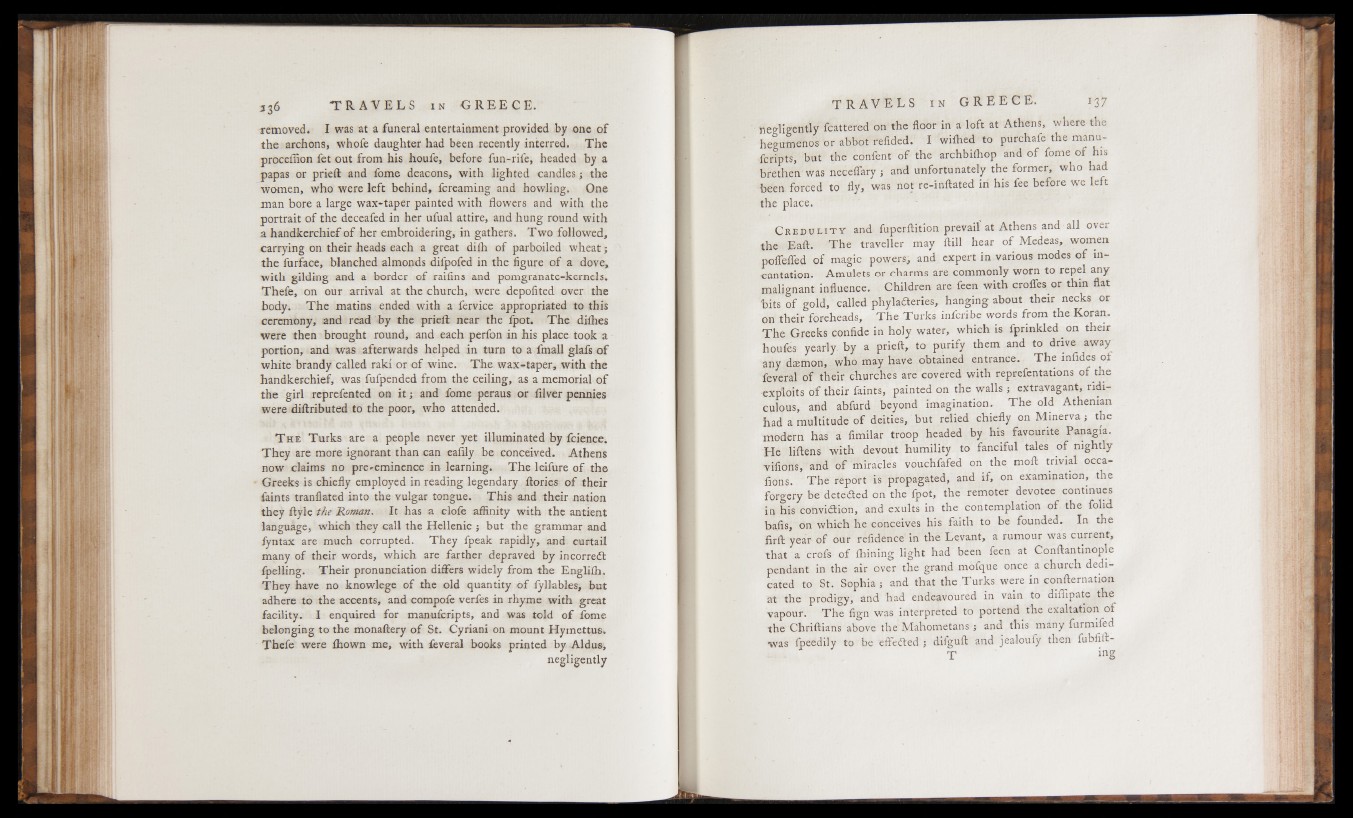
* 36 T R A V E L S , in G R E E C E .
-removed. I was at a funeral entertainment provided by one of
the archons, whole daughter had been .recently interred. The
proceffion fct out from his houfe, before fun-rife, headed hy a
papas or prieft and fame deacons, with lighted candles ; the
women, who were left behind, fcreaming and howling. One
man bore a large wax-taper painted with flowers, and with the
portrait of the deceafed in her ufual attire, and hung round with
a handkerchief o f her embroidering, in gathers. T wo followed,
carrying on their heads each a great difli o f parboiled wheat ;
the furfaoe, blanched almonds difpofed in the figure of a dove,
with gilding and a border of raifins and pomgranate-kemels.
Thefe, on our arrival at the church, were depofited aver, the
body. The matins g ended with a fervice appropriated to this
ceremony, and read by the prieft near the fpot. The difhes
were then s brought round, and .each perfbn in his place took a
portion, and was afterwards helped in turn to a fmall glafs o f
white brandy called raki or o f wine. The wax-taper, with the
handkerchief, was fufpended from the ceiling,; as a memorial .of
the girl represented on it ; and fome peraus or diver pennies
were diftributed to the poor, who attended.
T he Turks are a people never yet illuminated by fcience.
They are more ignorant than can eafily be conceived. Athens
now claims no pre-eminence in learning. The leifure of, , the
Greeks is chiefly employed in reading legendary, dories o f their
faints tranflated into the vulgar tongue. This and their nation
they ftyle -the Roman. It has a clofe affinity with the antisent
language, which they call the Hellenic ; hut die grammar and
fyntax are much corrupted. They fpeak rapidly, and. curtail
many of their words, which are, farther depraved by incorrect
fpelhng. Their pronunciation differs widely from the English.
They have no knowlege of the old quantity cxf iÿliablesi hut
adhere to the accents, ami compofe verfes in rhyme with great
facility. I enquired for manu&ripts, and was told of dome
belonging to the monaftery of St. Cyriani on mount Hytnettus,
Thefe were fhown me, with lèverai books printed byAldu®,
negligently
T R A V E L S i n G R E E C E . I f f f
lfe^ ig e fÓ y^ tt ïtfe dW lh e floor in?^M t at Athens, where the
heguméfiósHor abbot^eflded';1 I Wifhéd’ tó p u t ^ a f ê ’the mtóu-
fcrtfpts, but tff^' cdhfenrof the archbifhöp and’o f fóme of his
brethenwas neééffiriry | and unfortunately the former, who had
•he'endbfced to fly, was •norrd - iftffetéd^ 'h fe^ -b^ reiy e left
•the placé.,*
CREpuLi’EY and fuperftition prevail at Athens and all over
the Eaft. T h e " traveller may ftill hear of Medeas,^. women
poflefled of magic pow^r# and expert in .various modes o f incantation.
Amulets or charms are. commonly worn to repel any
malignant influence.. , Children are feen with crofles or thin flat
'hits óf gold/ called ‘pijfaSene», hanging about their necks or
Off-their foreheads, T h e Turks inferfber words from the Koran.
The Greeks confide in holy water, which is fprinkled Off their
h o u is yearly by a prieft, to purify them and to drive away
any daman, who,may have obtained entrance., The infides o f
fèveral o f r a f f ^ i r c l B are covered with reprefentations p f the
exploits of their faints, painted on the walls j extravagant, ridiculous,
and abfurd beyond imagination. The old Athenian
had a multitude of defies,' but relied chiefly qn Mmerva ^the
modern has a fimilar troop headed by his favourite Panagia.
'téith.1 devout' humility to' Fanciful tales ot nightly
■ vffiote, 'and vquchfafed qn the moll trivial occafibns!^
The report propagated, and if, on examination, the
forgery beMetófted bn the'fpot, the remoter devotee continues
m his'cob viel ion, andèxults in the contemplation of--the MM
bafis, dn‘Which he.eonceives hi^ faith to be founded.. In the
firll year- of our rêfidënce* in the Levant, a rumour was current,
that a p'tófs* of finding light had been leeff at Conftantinople
pendant in the air .over the grandmdfque ohce a church dedicated
to St. Sophia j and that the Turks were, in c p s te ia t io a
at the prodigy, and had endeavoured in vain tb difiipate the
vapour. The fign was interpreted to portend the exaltation of
the ‘Oiffiftiao'ié'abovfc ïhbiyEalb®ëtan$i?' and this maiyflurmiled
was fpeedily to be 'effected j dS%uft' and j ealoufy then fublift-
T ' inS